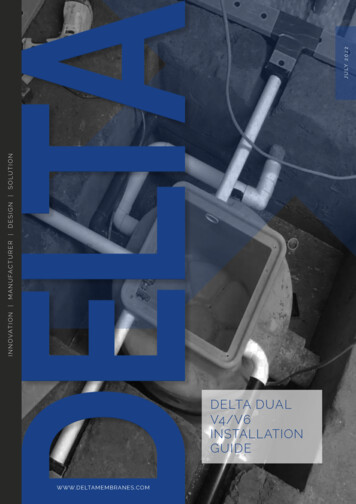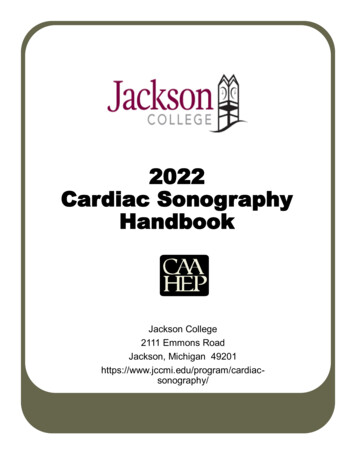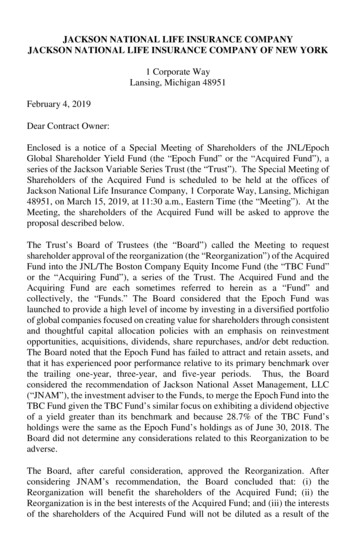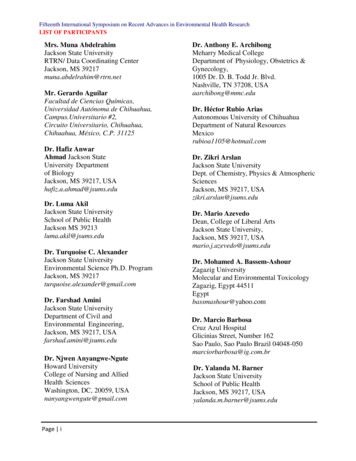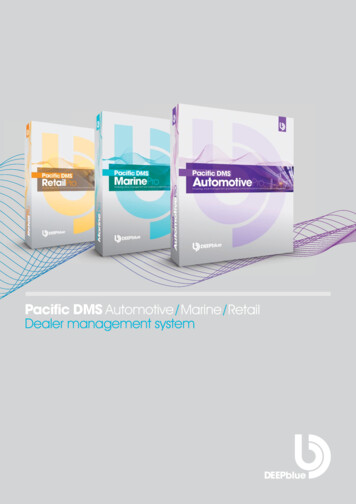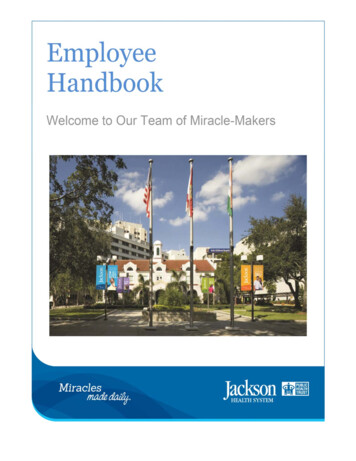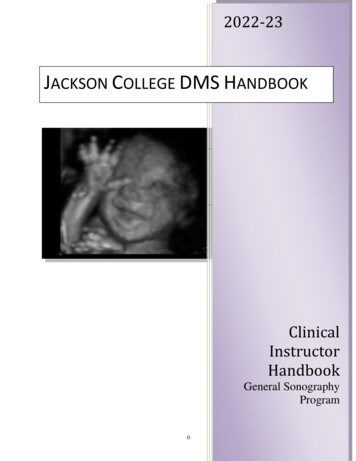
Transcription
2022-23JACKSON COLLEGE DMS HANDBOOKClinicalInstructorHandbookGeneral SonographyProgram0
DIAGNOSTIC MEDICAL SONOGRAPHY HANDBOOKWhat is a Diagnostic Medical Sonographer?A diagnostic medical sonographer is a highly skilled Allied Health professional who performsdiagnostic medical sonographic procedures utilizing high frequency sound waves. A sonographer isrequired to operate a variety of complex sonographic equipment as well as numerous ancillary devicesin order to perform a sonographic procedure.Sonographers have extensive, direct patient contact that may include performing and assistingin some invasive procedures. They must be able to interact compassionately and effectively withpeople who range from healthy to critically ill.The profession of Diagnostic Medical Sonography includes specializing in sonography of thehuman abdomen, obstetrical and gynecological, adult and pediatric cardiac, vascular technology,neurosonography, opthmologic, and breast sonography.Sonographers are qualified by acomprehensive educational process to provide services to the patient using diagnostic ultrasoundunder the supervision of a physician. Such sonographic services may be provided in an institution suchas a hospital or in a clinical setting, each whereby the physician is responsible for the interpretation ofthe sonographic images.Sonographers work as a team with the physician in collecting sonographic data for the purposeof diagnosing. According to the Commission on Accreditation of Allied Health Education Programs(CAAHEP) the Diagnostic Medical Sonographer is able to: Obtain, review, and integrate pertinent patient history and supporting clinical data to facilitateoptimum diagnostic results. Perform appropriate procedures and record anatomical, pathological and/or physiological datafor interpretation by a physician. Record and process sonographic data and other pertinent observations made during theprocedure for presentation to the interpreting physician. Exercise discretion and judgment in the performance of sonographic services. Provide patient education related to medical ultrasound. Promote principles of good health.1
Sonography Index:Academic Performance .Acceptance Process .Accommodations for Students with Disabilities .Appeals Process .Application for National Registry Exams . .Application Procedure .Application Requirements for DMS Programs .Attendance of MSS, SDMS and/or Vascular Conferences . .Attendance . Cell Phones . .Changes in Clinical Schedule Due to a Warning Notice Cheating .Clinical Experience. . .Clinical Hour Requirements .Clinical Policies and Guidelines . .Clinical Site Assignment. . Communicable Disease Policy Confidentially .CPR Certification . .DMS Lab . .Dress Code .Drug Free Campus Policy . .Employment Graduation & Commencement . .Health Certificate Form (Exhibit A & B page 17 – 20). . .Health Insurance . Health Requirements . .Holidays .Lodging . .Name Badge Personal Illness or Injury .Personal Problem Solving .Re-Admission to a SonographyProgram .Request to Schedule Clinical Absence (Exhibit C) . Request to Schedule Clinical Absence Cardiac (Exhibit D) Resolution of the Warning Notice . Scan Subject Release Form (Exhibit E). .Service Work Policy .Sonosim Usage Agreement Student Acknowledgement of Receipt of DMS Handbook Form.Student Conduct/Warning Notice Procedure . Student Conduct . .Student Health Issues .Student Scanning Policy. Student’s Reply to the Warning Notice (Exhibit F page 24). .Tardiness . .Testing Accommodations (ADA) .Technical Standards & Functions 2314249272813961015816
Technical Standards for Admission Allied Health Department .Vehicle Parking .209GENERAL SONOGRAPHYASSOCIATE IN APPLIED SCIENCE PROGRAM ADMISSIONPROCESSJackson College and the Allied Health Department are pleased that you are interested in the Associate in AppliedScience General Sonography Program. The selection process was established to enhance student success in theSonography curriculum and passing scores on the National Exam, American Registry of Diagnostic MedicalSonographers (ARDMS).APPLICATION PROCEDURE - ALL Applicants must:1) Submit a Jackson College application.2) Submit a completed Diagnostic Medical Sonography Advising Fact Sheet th/sonography/dms advisingfactsheet.htm3) Submit a completed Jackson College General Sonography Program Application Form and indicate the desiredprogram year. This application must be submitted directly to the Allied Health Office (JW 231). The applicationfee must be paid to JC’s Cashier’s Office.4) Be a high school graduate or successfully complete the G.E.D. test.5) Forward to the Jackson College Admissions Office ALL transcripts from colleges previously attended. It is yourresponsibility to confirm that your transcripts are on file. (Allow 8–10 weeks for transcripts to be processed. Alltranscripts MUST be received by the application deadline. Failure to have all transcripts submitted timely toJackson College may result in an incomplete General Sonography application).6) Meet Technical Standards for Admission of the Allied Health Department and Technical Standards and Functionsrequired for the General Sonography Program.APPLICATION REQUIREMENTS for the GENERAL SONOGRAPHY PROGRAMThe General Sonography Program is an integrated didactic and clinical training program designed to prepare thestudent for employment in the field of General Sonography. After successful completion of the nationallyrecognized ARDMS registry exam, the graduate will be eligible to write the initials RDMS behind his/her name.Admission Requirements and Process for the General Sonography Program1) Students must have completed the prerequisite course work with a final grade of 2.0 or better in each course.The following General Education and Pre-Requisite courses are required:1)2)3)4)5)6)7)8)9)10)* BIO 132 or* BIO 155or* BIO 253 and BIO 254ENG 131MAT 131PSY 140ADO 6ADO 8* HOC 130PHY 145 orPHY 131* MOA 120COM 231 orHuman Biology (4 credits)Human Anatomy and Physiology (4 - 5 credits)Human Anatomy and Physiology (4 - 5 credits)Writing Experience (3 credits)Intermediate Algebra (3 – 4 credits)Intro to Psychology (3 - 4 credits)(3 credits) please review course choices in catalog(1 credit or higher) please review course choices in catalogIntroduction to Health Occupations (3 credits)Introduction to Basic Physics (3 credits)Conceptual Physics (3 credits)Medical Terminology (2 - 3 credits)Communication Fundamentals (3 credits)3
11)12)COM 240DMS 100DMS 104Interpersonal Communication (3 credits)Introduction to Diagnostic Medical Imaging (3 credits)Introduction to Sonographic Instrumentation (3 credits)*Requires a final grade of 3.0 or higher for admission consideration.2) All applicants’ academic records are evaluated by using a numerical point system. Entry into the GeneralSonography program is competitive and is based on total points from the grades earned in prerequisite coursework and aninterview process. If a prerequisite course that is a “point counter” (see page 5) is not completed when theapplication is submitted, no points will be awarded for that course. Consideration for the sonographyprogram will still apply.3) All considered applicants will have an interview with the JC Admissions Committee.A. The Admissions Committee will be comprised of a minimum of three (3) of the following individuals:Program CoordinatorClinical InstructorClinical CoordinatorMedical AdvisorAllied Health DirectorA Representative of JC Student Affairs OfficeAny non-student member of the Sonography Advisory CommitteeB. All considered applicants will be asked to respond to similar set of questions during the consultationprocess. All considered applicants who live within a 200 mile radius of the College will be required tocome to the Jackson campus for this consultation process.C. All applicants will be scored by each member of the Admissions Committee and an average score isentered into overall point tally for admission considerations.D. Following the interview, all accepted applicants applicants will received the location of their assignedclinical site and upon their acceptance of this clinical location and passing the background check anddrug screen they will receive acceptance to the program.4) A clinical site must be arranged and approved for each applicant before final acceptance into the program.The clinical site is a third party entity into which students are placed for practical experience. JC cannotguarantee that a clinical site will always be available. Arrangement for such a site depends upon the college’sability to enter into a formal agreement with a proposed site. Students should not rely upon the availability of aclinical site in particular geographical location.While JC uses its best efforts to negotiate clinical sites, even after they become available they can becomeunavailable for reasons beyond the control of JC and in that event JC has no liability. No one at JC has authorityto modify the conditions and information outlined in this application other than in writing signed by the Director ofAllied Health.5) All accepted applicants will be required to submit a completed statement of health/physical condition. Thecompleted physical statement needs to include: medical history, physical exam results, and immunizations. Thisstatement must be received by the Allied Health office prior to any General Sonography student beginning theirclinical education.6) All accepted General Sonography students must submit proof of Hepatitis B vaccination or a signed waiver.Some clinical sites may require qualified applications to submit to a background check and a drug screen.7) Jackson College does not pay for health physicals and/or any required vaccinations.8) Admissions process is nondiscriminatory in regards to race, color, religion, national creed, national origin orancestry, age, gender, sexual preference, marital status, or handicap.9) All of the General Sonography program courses are offered online through Jackson College DistanceLearning. Even though the General Sonography program is an online program, all accepted applicants who livewithin a 200 mile radius of the College will be required to come to the Jackson campus for the following:4
Interview for the programOrientation into the Sonography programSonography Lab coursesCourse exams\10) All students admitted to the program will be required to attend a lab orientation (DMS 197) prior to beginningtheir clinical education of the sonography program. DMS 197 is a 10 week hands on lab course that prepares thestudent for clinical experience on central campus. Any student unable to attend the scanning lab course on JC’scentral campus due to geographical travel restrictions may be eligible to complete the course through an onlinedelivery method in their geographical location. It should be noted that this is rare as most clinical sites do nothave the time to accept this responsibility. The following circumstances will be considered to determineeligibility of hybrid delivery method:1. Clinical site location2. Program Director approval3. Clinical site (affiliate) approval.The following conditions must be met once eligibility status has been approved: A clinical site willing to sponsorthe student must meet the minimum requirements of a clinical affiliate listed below:i. A current affiliation agreementii. Completed, submitted and approved CC and CV forms.iii. Appropriate credentialed sonographers willing to facilitate the course requirements.courseiv. The sponsoring clinical site must be willing to work with student to complete the labcompetencies for the (DMS197) course.v. A cleared background check, drug screen and health physical form including immunization forms must beupdated in the Allied Health Office one month prior to the start of the course.11) Only those individuals with the highest total combined scores of the academic evaluation and the consultationsession will be accepted.ACCEPTANCE PROCESS1) The order of acceptance of qualified applicants will be based on points achieved. All prerequisites mustbe completed before an applicant can be considered for the General Sonography program.2) If more than one qualified applicant achieves the same score in the Point System for the last remainingspot, the applicant with the highest overall Jackson College grade point average will be admitted.3) If you are not admitted and wish to be reconsidered for the next program year you must complete a newProgram Application Form and the 50.00 application fee. Your application and application fee willNOT automatically be rolled over.4) Upon acceptance to the General Sonography Program, an applicant must complete the HealthCertification Form and obtain Professional Level CPR certification. This training includes infant, child,adult, 1 man – 2 man CPR and choking. This MUST be maintained and current while in the program.5) Notification of applicants’ status into the General Sonography program will be made in April for theupcoming spring semester (May). If an accepted student declines his/her admission and desires to beconsidered at a later date he/she must reapply.6) Upon acceptance to the General Sonography Program, you will need to have access to a computer withthe following minimum requirements:5
HardwareOperating System*ProcessorDisk StorageMemoryVideo CardMinimum screenresolutionInput PortsBrowser RequirementInternet ConnectionWebcamWindows 7, 8, 8.1, 10; Mac OS X 10.11; macOS 10.12, 10.13, 10.14,10.15Intel Core 2 Duo or AMD Athlon X2 at 1.5 GHz or fasterUp to 30 GB available disk space depending on modules purchased2 GB RAMNVIDIA GeForce 9000 or greater, ATI/AMD Radeon 5000 or newer,most Intel HD Graphics or newer**1024 768One USB port, directly accessible or via USB-C adapterUp to date Google Chrome or Mozilla FirefoxBroadband internet connection is requiredRequired*Please note that courses are available through most web browsers, but some requiredsoftware is not supported on ChromeBooks, MacBook Air, tablets, or mobile devices.**Integrated Intel HD 4000 or better graphics processors are generally capable of supporting oursoftware correctly, but some custom models supplied by certain computer manufacturers donot provide adequate support for the advanced graphics features required by the software.You must be able to upload and download documents and attach documents to an email. You must be familiarwith operation of the above software.6
Diagnostic Medical Sonography Program at Jackson CollegeThe DMS programs are integrated on-line course study and clinical training program designed toprepare the student for employment in diagnostic medical sonography.Program Goals:To prepare competent entry-level general sonographers in the cognitive (knowledge), psychomotor(skills), and affective (behavior) learning domains."Health RequirementsHealth Certificate Form: A Statement of Physical/Emotional Fitness must be completed (by thephysician of your choice) for the sole purpose of determining and documenting your physical statusprior to beginning the clinical component of your Allied Health Program (see Exhibit A). The HealthCertificate Form includes: a negative Tuberculin Skin Test or negative chest x-ray; proof ofimmunizations for Rubella (German Measles); Rubeola (Hard Measles); Tetanus/Petussis; the HepatitisB Vaccine Series; Varicella Zoster (Chicken Pox) or a physician diagnosed history of varicella zoster;and a recent physical examination. It is preferable that the Hepatitis B series is completed prior toentering the Allied Health program; however, minimally it must be started or a waiver signed before thestudent is allowed to attend the clinical site. This Health Certificate Form must be completed andreturned to the Allied Health Office prior to starting any clinical education courses. You will want toretain a copy of this document for your own records.Immunization Requirements: Jackson College follows the policies of the clinical site and will requirestudents to comply with all policies to submit health records and immunization requirements.According to the Center for Disease Control (CDC) they recommend, all healthcare personnel (HCP)show evidence of immunity to measles, mumps, rubella and varicella. In addition, due to the potentialexposure to blood or bodily fluids and risks related to direct patient contact, the CDC recommends thatHCP protect themselves with vaccinations against Hepatitis B and Tetanus/Diphtheria/Pertussis,Influenza, SARS COVID-19, and be screened for Tuberculosis. Jackson College students must providedocumentation of compliance with clinical partners and the CDC Healthcare PersonnelRecommendations. Documentation of immunity must be a copy of an official immunization record orcopies of lab reports indicating positive titers (self-reporting or parent’s record of disease orvaccinations is not acceptable). See Appendix A-BThe clinical education site policy may require additional immunization not listed on this form in order toparticipate in the clinical education. The Allied Health/Nursing Department Coordinator will provide thestudent a list of the additional immunizations if different from the list provided on this form.Students who are not fully vaccinated against COVID-19—regardless of the reasons for theirdeclination of being vaccinated, and even if such declination is predicated upon a legally-cognizabledisability or a sincerely held religious belief—the student may not be able to: (1) participate in anexternship/practicum/Capstone Field Internship experience; (2) complete the requirements andgraduate from the program; (3) sit for any licensing or certification examinations in the profession; and(4) be employed in the professionCPR Certification: It is also required to obtain “BLS for Healthcare Provider” CPR Certification via TheAmerican Heart Association. This training includes infant, child, adult, 1 man – 2 man CPR, chokingand AED devises. CPR must be maintained and proven every 2 years.Student Health Issues: It is the student’s responsibility to inform the Program Director of any illness,injury, surgery or medical condition that might compromise the safety of either the student or the7
patient(s) (i.e. lifting limitations, contagious disease, pregnancy, etc.). If a student has an infectiouscondition that may endanger clients in the clinical sites, they need to inform the Program Director of thesituation and provide a written letter from their health care provider stating that it is safe for them toreturn to the clinical site. While in the program, any student with a medical condition or injury whichcauses a student to miss clinical for over two (2) days, will be required to obtain a written doctor’srelease to continue in class and clinical and/or to return to class and clinical. The release will verify thats/he is able to meet class/lab/clinical practice requirements without restrictions on activity (such aslimitations on weight lifting). The goal is to prevent aggravating an existing condition, or jeopardizingthe students, classmates or patient’s safety or well being. If a student must interrupt the clinicalcomponent for period greater than two (2) weeks, the student will only be re-admitted intoclinical with the Program Director and Clinical Instructor’s permission. If at any point there areconcerns regarding a health problem or disability, Jackson College reserves the right to require amedical release or physical examination. Students are responsible for contacting the Program Directorregarding concerns or risks related to their own health care needs. Students must meet the TechnicalStandards and Functions (see Exhibit B) set for participants in the Jackson College Allied HealthPrograms with or without reasonable accommodation.Health Insurance: It is important that you maintain health insurance to defray the cost of hospital andmedical care of any illness or injury that may be sustained while participating in a clinical experience.Substantial monetary liability can be incurred if you do not have medical insurance and injury or illnessoccurs. Some clinical sites may require students to demonstrate proof of health insurance.CLINICAL SITE ASSIGNMENTA clinical site must be arranged and approved for each applicant before final acceptance into theprogram. The clinical site is a third party entity into which students are placed for practical experience.The clinical staff employees are not paid Jackson College faculty for the clinical education portion of theprogram. Jackson College cannot guarantee that a clinical site will always be available. Arrangementfor such a site depends upon the college’s ability to enter into a formal agreement with a proposed site.Students should not rely upon the availability of a clinical site particular geographical location.While Jackson College uses its best efforts to negotiate clinical sites, even after they become availablethey can become unavailable for reasons beyond the control of Jackson College and in that eventJackson Community College has no liability.CLINICAL POLICIES AND GUIDELINESAll DMS courses must be completed with a 2.0 or higher to be considered passing for the DMScurriculum completion.All DMS clinical courses are subject to special scheduling dates which may or may not follow thecollege semester dates and/or the college calendar.Clinical Experience: It is expected that student’s high learning curve days of clinical will be on thosedays when the clinical site has a lower case load. Low learning curve days are when the clinical site isvery busy with a heavy case load. On busy days, the student is expected to be of as much help to thestaff as is possible. However, the students are placed in a clinical site as a learning modality and wewish to utilize this clinical experience to the fullest extent possible. Students must understand andadhere to the policies the clinical site requires prior to working in that particular clinical site.Clinical Hour Requirements:8
The MINIMUM Clinical Practicum hours for the General Sonography Program are 1,350. Students areexpected to attend all scheduled clinical days. Minimum hours are only used in the event of anunforeseeable catastrophe.Clinical Assignment: The Jackson College Clinical Coordinator will establish the specific studentclinical assignments and rotation for each clinical site. Students may be expected to commute to anadditional clinical site (other than the initial clinical site assigned to them) to obtain the completeeducation of the sonography program. The Jackson College Program Coordinator and ClinicalInstructors must approve all student rotations.A Basic Clinical Site Schedule will be utilized as a guide by the Clinical Coordinator. The clinicaleducation schedule will be determined by the assigned Clinical Instructor of the clinical site. The DMSstudents may be required to follow the workday schedule of their clinical site. Lunches and workbreaks will be at the discretion of the supervising sonographer. Time is not given for a 30 minute lunch,this means that a student must be at their clinical site for 8.5 hours per day in order to reach their 8hour minimum requirement per day. The clinical schedule is determined by the clinical site not thestudent. Students should contact their instructor if they have a problem with their schedule; however,the clinical site’s needs shall dictate the schedule.Clinical Coordinator: A Jackson College faculty who provides DMS clinical education directionfor students while at their assigned clinical site.Clinical Instructor: An employee of the assigned clinical site who will support/supervise theclinical education that the Jackson College student is receiving during their clinical education.DMS students are required to follow all rules and regulations of each clinical site they are assigned.Students violating such rules or regulations will be subject to the warning process and/or dismissal fromthe DMS program.It is the student’s responsibility to establish a working relationship with their clinical site. Failure to doso will result in the student being dismissed from the clinical setting and therefore the program.Students violating such rules and regulations will be subject to a warning process and/orGENERALPOLICIESANDPROCEDURES FOR ALL ALLIED HEALTH STUDENTSdismissal fromthe DMSprogram.Attendance: Dependability and punctuality are important factors in the DMS clinical component. Anyabsences or tardiness, no matter how legitimate, disrupts the learning process of the student anddisrupts the operational function of the Ultrasound Department. Students must complete a request forclinical absence for an approved scheduled absence. (See Exhibit C). Students are expected toattend all scheduled clinical days. Any clinical days missed must be made up by the end of thesemester. Minimum hours are only used in the event of an unforeseeable catastrophe.Students are required to notify the appropriate supervisor at their clinical site of their absences for eachoccurrence. The notification of absence intent should be at least 1/2 hr. (30 minutes) prior to thestudent’s scheduled starting time. All missed clinical time must be made up within the semester that theabsence accord. One absence that is not reported to the appropriate supervisor will result in a warningaction.Students are required to be at their DMS clinical site until the completion of an eight (8) hour shiftunless permission is obtained from the supervising clinical instructor and the supervising sonographer.Students will only receive clinical hours for time actually spent within the clinical setting. Students arerequired to submit clinical attendance reporting forms.The student is to notify the attending sonographer whenever the student leaves the DMSlab/department. Failure to do so may be interpreted as abandonment of the clinical assignment.9
Tardiness: Excessive tardiness may result in a warning action.Injury: Any student who incurs an injury during their program studies at a clinical site must notify theClinical Instructor and Program Director as soon as possible. The student will be instructed to followthe clinical site’s process when such an injury occurs within their facility.Personal Illness or Injury: Any student who is unable to perform the routine duties of a sonographerbecause of personal illness or injury must notify the Clinical Instructor and Program Director as soon aspossible. The student must notify the Clinical Instructor and Program Coordinator as soon as possiblein writing of the anticipated length of the illness or disability.Federal Law Concerning Chemical HazardsFederal law requires that all individuals must be notified about hazardous chemicals present in the workplace. This law applies to all occupations, with the basic purpose of raising the level of consciousnesson chemical safety. There are safe levels and proper procedures or precautions to be followed whenhandling any chemical, just as there are when working with x-ray.Chemical suppliers are required to prepare Material Safety Data Sheets (MSDS) for all chemicals inradiology. The MSDS should be accessible for your review. The clinical instructor will provide studentswith information specific to their department.Dress Code: The student’s dress and appearance is a reflection of themselves as well as JacksonCommunity College and the clinical site. The student’s appearance will reflect good personal hygieneand professional dress during all of their clinical practicum and be compatible with the dress code oftheir current clinical site. The student should check with the clinical instructor regarding specificrequirements of the clinical site.The Jackson College DMS student uniform may consist of the following: Must comply with the Clinical Site’s dress code Clinical scrubs when indicated by clinical siteThe student’s mode of dress must adhere to the proper safety regulations andrequirements of the clinical site. Excessive amounts of jewelry and sandals are NOT to beworn while at the clinical site.NO JEANS OR SWEAT PANTS ARE TO BE WORN AT A CLINICAL SITE DURINGSCHEDULED CLINICAL PRACTICUM.Name Badge: All DMS students will be required to wear a name badge. The name badge may beprovided by the clinical site.Employment: Students are encouraged NOT to work during the DMS program. Due to limited clinicalsite affiliations and scheduled workdays within the Ultrasound labs, students will be required to follow arigid schedule during their clinical site portion of the program. Therefore, if a student chooses tocontinue to work while in the program, the clinical site schedule will not be altered or adjusted in anyway to conform to the students’ personal work schedule.DMS students are NOT allowed to accept financial compensation for any of their clinical sitecomponent.Service Work: Students may not take either the responsibility or the place of qualified staff. However,after demonstrating competency, students may be permitted to undertake certain defined activities10
under appropriate supervision and direction. Students may be employed in a clinical setting outsideregular educational hours, p
The profession of Diagnostic Medical Sonography includes specializing in sonography of the human abdomen, obstetrical and gynecological, adult and pediatric cardiac, vascular technology, neurosonography, opthmologic, and breast sonography. Sonographers are qualified by a comprehensive educational process to provide services to the patient using .
